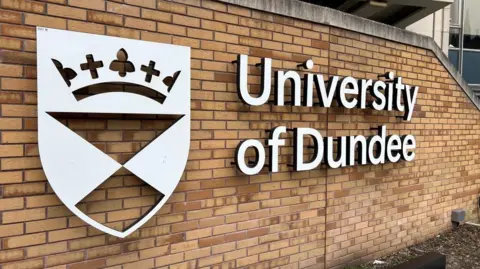Dundee University to receive a further £40m support
 BBC
BBCDundee University will receive an extra £40m from the Scottish government as the institution continues to tackle its financial crisis.
Education Secretary Jenny Gilruth said the decision would place specific conditions on the funding which will be paid over two academic years.
Gilruth said the money was "not rewarding failure" but responding to an "unprecedented and unique situation".
The university currently faces a £35m deficit and was the subject of a damning independent report last week into its financial situation.
The university's new interim principal described the additional funding as "invaluable".
The award is unprecedented as it will be allocated by the Scottish Funding Council (SFC) on the order of ministers.
The Scottish government has the power under the Further and Higher Education (Scotland) Act 2005 to direct the SFC to target a direct settlement to the university and to place specific conditions on the funding.
This is the first time these powers have been used.
Gilruth said: "Scotland's universities are independent and autonomous institutions.
"In normal circumstances, decisions on the allocation of funding to individual institutions are the responsibility of the SFC.
"However, this is a unique and unprecedented set of circumstances, which requires a unique and unprecedented response."
She added that the funding would only be released once a "sustainable long-term recovery plan" was in place from the university and was subject to further due diligence "prior to any expenditure spending".
The university received £22m from the SFC in February as part of funding to support universities facing financial challenges.
Dundee University is shedding 300 roles through a voluntary programme - after initially forecasting that about 700 jobs would go.
Last week's report, which was led by Prof Pamela Gillies, said university bosses and its governing body failed multiple times to identify the worsening crisis and continued to overspend instead of taking action.
Interim principal Prof Shane O'Neill resigned immediately following the publication of the report.
 University of Dundee
University of Dundee University of Dundee
University of DundeeProf O'Neill took over as interim principal in December but he was previously deputy vice chancellor.
He was identified in the report - along with former principal Prof Iain Gillespie, the chief operating officer, and the director of finance - as one of the university leaders who "did not cultivate a culture of openness and challenge at all levels".
Both men are expected to give evidence to Holyrood's education committee on Thursday.

This is unprecedented. Usually university funding is distributed by the Scottish Funding Council.
But the Scottish government is using statutory powers under the Further and Higher Education (Scotland) Act 2005 to award money directly to Dundee University.
This kind of bail-out can only happen in circumstances where there's been financial mismanagement.
The education secretary, Jenny Gilruth, was keen to stress that this should not be seen as a reward for failure.
But other institutions, who have been more careful with their finances, may be justified in feeling hard done by.
Ministers have acknowledged that Dundee University is simply too important, not just to the City of Discovery, but to Scotland as a whole, to be allowed to fail.
The idea is that the extra funding should allow it to leverage in extra private investment or commercial loans.
And if it's not enough? Well ministers haven't ruled out providing more support if required.
But the university remains in a precarious position. As opposition MSPs have pointed out, the damage to its reputation will do nothing to help the recruitment of staff and students in the future.

Prof Nigel Seaton, who was announced as the university's interim principal on Friday, said the institution was "extremely grateful" to the Scottish government and SFC.
He said: "This is invaluable in helping us reach a more sustainable position and will provide welcome reassurance to staff, students and our wider stakeholders.
"We will continue to engage with the funding council on a full recovery plan, and in pushing forward with our ongoing work to strengthen our management and governance."
The professor added that the university did "not take lightly" the responsibilities which came with "this level of additional public support".
He said: "We have to be better as an institution than we have been and I, and my colleagues, are absolutely determined that we will be."
The Scottish Conservatives education spokesman Miles Briggs said: "While the priority must be ensuring Dundee University gets on the road to recovery, it is hard to accept that we should just draw a line under the financial vandalism that went on for far too long.
"Those responsible for that gross mismanagement have rightly fallen on their sword but we must now see SNP ministers robustly scrutinise how the university will bring their finances into a sustainable position going forward."
Scottish Labour's Michael Marra said "Professor Gillies' report lays bare the financial vandalism that has created this crisis. There is relief that the behaviour of individuals is now out in the open but huge anxiety remains on the future of the institution.
"We must all focus on how we build a sustainable future for Dundee's most important institution.
"The education secretary has acknowledged that future income growth from international recruitment is highly unlikely, so it is hard to see how it expects the university to repay a £60m loan."
